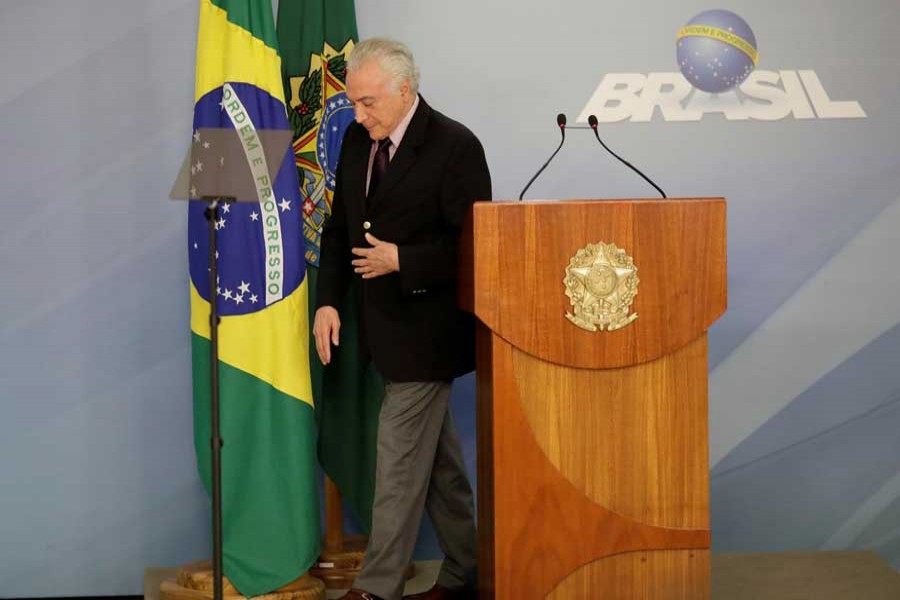Brazilian President Michel Temer scrambled to name a new chief executive for state-controlled oil producer Petroleo Brasileiro SA on Friday, after the surprise resignation of CEO Pedro Parente over fuel pricing policies.
Parente’s departure wiped $11 billion off the market value of the company, known as Petrobras, and marked the highest profile casualty so far of a truckers’ strike that virtually paralysed Brazil for nearly two weeks.
Once a beacon of national pride, Petrobras had become engulfed in a damaging corruption scandal and overloaded with debt before turnaround wizard Parente’s arrival as CEO two years ago.
His replacement Ivan Monteiro, until Friday Petrobras’ chief financial officer and formerly a top executive at state-controlled bank Banco do Brasil, will be under pressure to show he can keep cutting debt and pushing investor-friendly policies.
Petrobras’ board said it had named Monteiro as interim CEO at a rapidly organised meeting on Friday, and Temer recommended him to take on the job on a longer-term basis later in the day. However, with elections looming, Monteiro’s tenure is likely to end in December when the president leaves office.
Shares in Petrobras, Latin America’s biggest oil producer, closed down 15 per cent on Friday, wiping some 40 billion reais ($11 billion) from the company’s capitalisation.
The real currency weakened as much as 1.0 per cent against the dollar. Petrobras bonds also fell, as Moody’s called Parente’s resignation credit negative for the company.
Temer sought to reassure markets as he announced his recommendation of Monteiro.
“We will maintain the economic policy that took the company out of the red in the last two years and made it once again one of the most respected in Brazil and abroad,” he said.
“There will be no interference at all in the company’s pricing policy.”
Pricing policies
Parente arrived at a Friday morning meeting with Temer with his resignation letter already in hand, a company source and a person close to the government said.
In it, Parente said he was leaving because he would “not be an obstacle” to new pricing policies that might be necessary to shield Brazilian consumers from volatility in world oil prices.
During 2010-13, the company posted about $40 billion in refining losses due to unprofitable fuel prices, imposed by the then-government, according to Moody’s.
A key plank of Parente’s turnaround campaign for the company and a condition for his taking the top job in 2016 was freedom to control fuel prices. He sought to align those more closely with international markets through nearly daily price adjustments.
But on Sunday Temer, governing with rock-bottom approval ratings, announced plans to placate striking truck drivers - protesting the high cost of diesel - by freezing fuel prices on a monthly basis and taking other measures to bring domestic diesel prices down.
Late on Friday, Brazil’s Mines and Energy Ministry said it wanted to create a pricing mechanism that would protect consumers without impacting the policies of Petrobras and other energy companies.
‘Reached his limit’
Although Temer promised the government would compensate Petrobras for losses incurred by its intervention on fuel prices, Sunday’s move crossed Parente’s red line against political meddling, sources said.
One source close to Parente said the 65-year-old had stepped down because he had “reached his limit” with government interference.
Another source close to Temer said the president was surprised by the resignation and had not sought to push the CEO out.
Parente’s departure comes days before Brazil hopes to attract foreign oil companies to bid on oil fields in its coveted “presalt” exploration areas and leaves in limbo several of his key priorities, including selling major refineries.
Also unresolved is a long-running dispute with the government over an oil-rich offshore area, which could represent a windfall for Petrobras if a deal is reached.
Parente’s policies had helped pushed Petrobras shares to a multiyear peak just last month, but a rise in international oil prices triggered anger at Brazilian gas stations and led to calls from politicians and unions for the executive to go.
The company risks becoming a political football in October’s presidential election, with far-right candidate Jair Bolsonaro’s key economic adviser calling for its privatisation, while leftist Ciro Gomes has warned investors to avoid state energy sector assets because he would expropriate them.
While investors and oil industry insiders bemoaned Parente’s departure, others rejoiced.
“Parente was the most responsible for the crisis that Brazil has faced with the trucker strike,” the truckers lobby said in a statement. “Nothing justifies the abusive diesel prices put in place by the company in the last few months.”
Petrobras oil workers, who walked off the job earlier week in part to demand Parente’s dismissal, also celebrated.
“You don’t deserve to walk through the doors of Petrobras again,” said Jose Maria Rangel, leader of FUP, Brazil’s largest oil workers union, in a video message, Reuters reported.
Parente’s market-friendly policies had ultimately made him the scapegoat of the truckers strike and its fallout, said Roberto Castello Branco, a former Petrobras board member. “The pressure on him was enormous,” he said.
“For the country, for the company, a great source of uncertainty has opened that is very dangerous,” he added.


